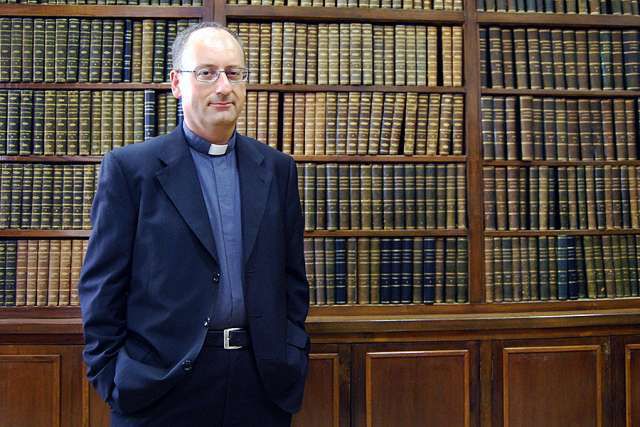A prominent Jesuit publication’s essay on American religion and politics continues to provoke responses from critics concerned its two authors fundamentally misunderstand the situation of Catholics in the United States.
“Their essay is bad but important,” said New York Times columnist Ross Douthat Aug. 2, saying its apparent intention is to warn about Catholic support for “the darker tendencies in Trumpism” like xenophobia, stigmatization of enemies, the “prosperity-gospel inflected worship of success,” and a “crude view of Islam.”
For Douthat, however, the authors’ understanding of American religion “seems to start and end with Google searches and anti-evangelical tracts.” In his view, secularization and political polarization have made the place of Catholics in the U.S. “more difficult and perplexing.” Both Catholic support for Trump and more radical Catholic critiques “are not the culmination of the Catholic-evangelical alliance but rather a reaction to its political and cultural failures — and the failures of liberal religious politics as well.”
On July 13 the Jesuit-run journal La Civilta Cattolica published an analysis piece co-authored by its editor, Father Antonio Spadaro, S.J., and Marcelo Figueroa, a Presbyterian pastor who is editor-in-chief of the Argentine edition of L’Osservatore Romano, the daily newspaper of Vatican City.
The piece, titled “Evangelical Fundamentalism and Catholic Integralism in the USA: A Surprising Ecumenism” made a number of claims, alleging that many conservative Christians have united to promote an “ecumenism of hate” in policies that contradict Pope Francis’ message of mercy. They claimed that that “Evangelical fundamentalists” and “Catholic Integralists” are being brought together in a “surprising ecumenism” by a shared desire for religious influence in politics.
Douthat said the essay’s authors seemed to be motivated by “fear and ignorance.”
Their attack on Trump-friendly positions expands and conflates “very different political and religious tendencies, indulging in paranoia about obscure theocratic Protestants and fringe Catholic websites, and ultimately critiquing every kind of American religious conservatism.” Their critique includes “the largely anti-political Benedict Option and the pro-life activism fulsomely supported by Francis’ papal predecessors.”
“None of this makes any sense,” Douthat said. “The post-1970s evangelical-Catholic alliance has been flawed in various ways, but it is neither theocratic nor illiberal.”
He said both American Catholics and Protestants feel “their leaders and thinkers have spent decades rallying to the republic, trying to bring about its moral and political renewal … only to see republican virtues decaying, liberalism turning hostile to religious faith, and democratic capitalism delivering disappointment and dislocation.”
Douthat saw an increase in “disillusionment and homelessness” among Catholic thinkers. Older Catholic approaches to politics seem to be out of energy and influence. Western liberalism seems “at once hostile to traditional religion and beset by internal contradictions,” which seems to make the moment “ripe for serious Catholic rethinking.”
In both the rhetoric of Pope Francis and among unsettled American Catholics are hints that American politics is in a transition point. Douthat argued that Fr. Spadaro and Rev. Figueroa missed this.
“In their evident paranoia about what the Americans are up to, you see a different spirit: a fear of novelty and disruption, and a desire for a church that’s primarily a steward of social peace, a mild and ecumenical presence, a moderate pillar of the establishment in a stable and permanently liberal age,” Douthat claimed, saying that those who desire such a Church need to do better to understand “why so many of their flock, in Europe and the United States, find this vision insufficient to the times.”
Catholic commentator George Weigel, a senior fellow at the Ethics and Public Policy Center, questioned the decision to publish the essay.
Writing at First Things Aug. 2, Weigel noted that La Civilta Cattolica is often read because it is vetted by the Secretariat of State. Its articles are assumed to have “quasi-official” status and are commonly believed “to reflect the cast of mind of the current pontificate.”
“What kind of vetting did this misbegotten article get? Were any knowledgeable experts on U.S. Catholicism or American evangelical Protestantism consulted on what the overseers must have known would be an incendiary piece?”
If the article really represents the views of the Secretariat of State, Weigel asked, he questioned how to interpret the speech of apostolic nuncio to the U.S., Archbishop Cristoph Pierre, whose address to the U.S. bishops “bears no resemblance to the wasteland of madcap pseudo-theology and hatred.”
Weigel approvingly summarized other critics of the article for an “ill-informed misrepresentation of American religious history”; for “surreal descriptions” of 21st century Catholicism and evangelical Protestantism; its “obsessions with marginal figures in contemporary American religious life”; and its “misreading” of how religion informs public debate in the U.S.
He suggested that the journal and the credibility of the Secretariat of State could be better served by severing the connection, warning that the interpretations of the article “raise deeply disturbing questions about the competence of both parties.”
The New York Times depicted the Civilta Cattolica essay as “A Vatican Shot Across the Bow for Hard-Line U.S. Catholics.” The essay has drawn defenders in publications such as Commonweal Magazine and the National Catholic Reporter.
However, the editors of Commonweal Magazine, themselves unsympathetic to U.S. Catholic conservatism, are also among the critics.
In a July 25 editorial, they described the essay as “a mishmash of wild and erroneous claims, made in a disjointed, almost impenetrable style,” whose authors “seem woefully ignorant of American religious history.” They said the essay was a “lost opportunity” to criticize the partisan use of religion in a way that might engage “those who do not yet have ears to hear.”

